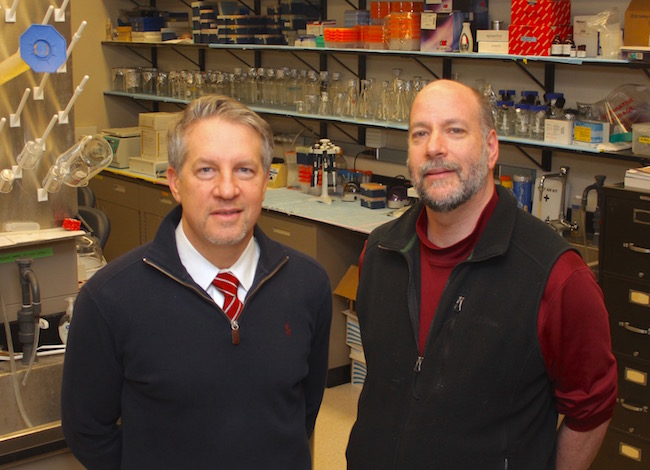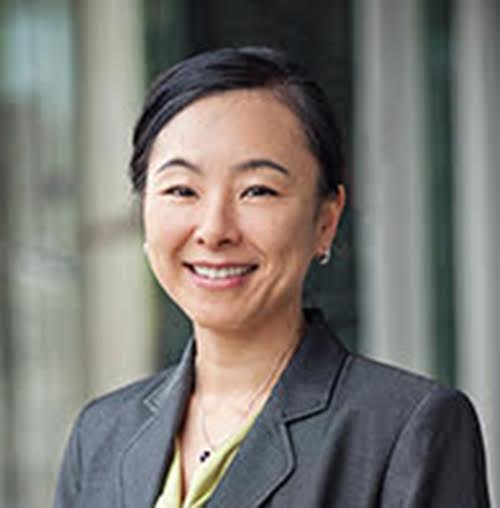Regenerative Medicine resource center focuses on first projects5 min read
Ann Arbor, Mich., Dec. 18, 2017 -– The Michigan-Pittsburgh-Wyss Regenerative Medicine Resource Center, led by the School of Dentistry, is moving forward in its quest to find and support promising new ways to restore dental, oral and craniofacial tissues lost to disease, injury or congenital disorders.
Announced last March, the center is funded by an $11.7 million grant from the National Institute of Dental and Craniofacial Research. The leadership team includes researchers from the University of Michigan, University of Pittsburgh and the Wyss Institute at Harvard University.
The center brings together a multi-disciplinary team of scientists, engineers, clinicians, and regulatory and technology commercialization experts who evaluate projects submitted by researchers from academic, for-profit and non-profit organizations. The project can receive up to $150,000 for one year. The resource center contributes not only scientific expertise to the projects, but also helps guide the researchers and their new technologies through steps such as Food and Drug Administration requirements, pre-clinical studies, market analyses and commercialization strategies, and other requirements on the way to the ultimate goal of widespread use in clinical practice.
In the time since NIDCR announcement last March, the center hired staff and has nearly completed its first cycle of soliciting, evaluating and selecting promising projects to fund.
The first cycle drew 35 applications, with 18 selected for further consideration. An announcement of which first-cycle projects will be funded is expected in early 2018.
A second cycle is now underway with a first deadline of Jan. 12 for Requests for Pre-Proposals.
Those initial proposals will be evaluated in January and February, with leading projects invited to submit a more detailed proposal and funding selections announced in summer 2018. More information on the funding process and deadlines is available on the center’s School of Dentistry web page.

The center’s directors and principal investigators are School of Dentistry faculty members David Kohn and William Giannobile. Kohn is professor in the Department of Biologic and Materials Sciences and also is a professor of biomedical engineering in the College of Engineering. Giannobile is the William K. and Mary Anne Najjar Professor of Dentistry and Chair of the Department of Periodontics and Oral Medicine, and a professor of biomedical engineering in the College of Engineering. Other principal investigators are Charles Sfeir and William Wagner at Pittsburgh and David Mooney at Harvard.
The center includes U-M collaborators from the Medical School, School of Public Health, College of Pharmacy, College of Engineering, the Office of Technology Transfer and the Michigan Institute for Clinical and Health Research, as well as contributors from private companies. The three universities committed financial support in addition to the $11.7 million NIH award to create a project total of about $14 million over three years.
Regenerative medicine refers to a process which seeks to regenerate damaged cells, tissues or organs to their full function, such as finding ways for the body to heal wounds faster or to repair bone that has been damaged. Research strategies often integrate engineering and biology, and can incorporate biomaterials, biologics and drug delivery, cellular therapies, medical devices or combinations of those. Some of the current material-based research in the craniofacial area, for example, uses tiny polymer-based scaffolds that are implanted to promote the growth of damaged bone or periodontal tissue that supports teeth or tooth replacement dental implants.

Center leaders were pleased with the number of applications submitted in the first cycle, and they continue to promote the new center to researchers nationally, said Mutsumi Yoshida, managing director of the center’s U-M site. Applications so far have come from researchers at universities as well as from for-profit organizations. Projects focused on many types of dental, oral and craniofacial research, including areas related to bone, periodontics, dental implants, nerves, muscles and skin.
The organizational structure of the center identifies five stages: Discovery and Conceptualization; Assessment; Testing and Validation; Prototype Manufacturing; and Clinical Approval. The center includes various integrated teams and advisory boards under the purview of an operating committee and NIDCR external oversight. The most-promising technologies will be nurtured and expedited through novel academic-private practice and academic-industry partnerships. Successful outcomes might include, for example, the launch of a clinical trial or commercialization of a technology via licensing to an existing or a newly formed company.
The hiring of Yoshida, who works at the School of Dentistry, was announced last summer by Kohn and Giannobile. Yoshida manages the Interdisciplinary Translational Project Program, which is the center’s funding mechanism. She coordinates program needs with Patrick Cantini, a program administrator at the University of Pittsburgh’s McGowan Institute.
Yoshida joined the regenerative medicine center from the U-M Office of Technology Transfer, where she was a senior licensing specialist collaborating with faculty and researchers to protect and commercialize intellectual property developed at the university, with a focus on biomedical innovations. She was previously a post-doctoral fellow in chemical engineering at U-M, supported by the Dental School’s long-standing NIH training grant in tissue engineering, and an associate scientist at Pfizer Global Research and Development. She holds a PhD in biomedical engineering from Georgia Tech and Emory University and bachelor’s and master’s degrees in chemical and biomedical Engineering, respectively, from U-M.
###
The University of Michigan School of Dentistry is one of the nation’s leading dental schools engaged in oral health care education, research, patient care and community service. General dental care clinics and specialty clinics providing advanced treatment enable the school to offer dental services and programs to patients throughout Michigan. Classroom and clinic instruction prepare future dentists, dental specialists, and dental hygienists for practice in private offices, hospitals, academia and public agencies. Research seeks to discover and apply new knowledge that can help patients worldwide. For more information about the School of Dentistry, visit us on the Web at: www.dent.umich.edu. Or contact Lynn Monson, associate director of communications, at [email protected], or (734) 615-1971.
